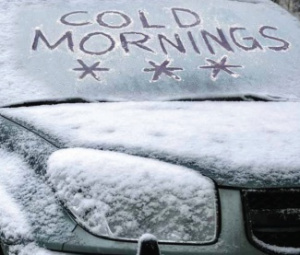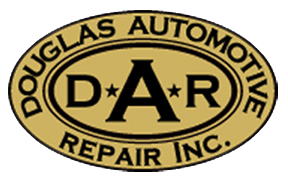
The extreme cold days of winter can be as brutally harsh on your car as they feel to you. Batteries are compromised, antifreeze is challenged and oil viscosity is altered in extreme conditions. Factor in components that may already be compromised before the cold weather moved in, and you have a perfect recipe for disaster. It’s not too late to have your vehicle checked out before the next cold snap moves through.
The Battery
The battery is the first component called upon to start the vehicle. It needs to supply 100-200 amps in order to turn the starter against the flywheel and crank the engine over. Batteries for your car will often produce twice or two-and-a-half times more cold cranking amps than is required to start the engine. The problem is, during extreme temperatures, the amperage capacity of the battery can be dwindled to half its output. In addition, if the vehicle is parked outside in inclement weather, the flywheel and starter wheel can become frozen. Although it would most likely turn under the correct amperage from the battery, a compromised battery will be ineffectual.
Douglas Automotive Repair Inc can check your battery to see if it’s up to snuff. Give us a call or use our convenient on-line request form today.
Fuel
Keeping condensation from the fuel and fuel lines is another reason why cars won’t start in winter months. A full tank of gas can produce one pint of condensation inside the fuel tank. Once the fuel lines shut down after the engine stops, condensation can begin to form inside the fuel lines. If they reach the throttle before the actual fuel, the vehicle will not be able to turn over. Considering the compromised position that a new battery is under during extreme cold, it doesn’t take long for an engine that won’t turn over to such the existing amperage from a battery and then compound the problem. In addition, the starter heats up very quickly and continuously trying to turn a stubborn engine over could easily damage the starter.
Coolant and Oil
Although coolant and oil are important no matter what time of year it is, and even though neither one will have an effect on whether or not your vehicle will start, they are essential in extreme conditions. Thinner weight oil will prevent coagulation of the oil properties which will help move the oil into the engine once started. Coolant in the engine block should be properly mixed–not too concentrated and not too lean–in order to ensure the correct temperature and pH balance. Because of the extreme differences between a cold engine and a running engine, it doesn’t take long for a cold engine to heat up. If the temperature of the antifreeze is not correct, you can crack your engine block.
Have you checked your antifreeze to make sure it’s ready for the extreme cold once again heading our way? We can help. Give us a call or use our convenient on-line request form today!
Steps to Beat the Cold
As mentioned, having the car checked regularly will go a long way in preventing no-starts in winter. On extremely cold nights, you could place a battery charger onto your battery. Use the trickle charge option only in order to make sure you do not overcharge your battery, which isn’t good either. A trickle charge will help keep the battery warm for the initial turnover when demand is called upon it. If your battery charger does not offer a trickle charge option, trade it in for one that does.
Using the correct dry gas product in your fuel lines will help prevent condensation from forming. Many fuel-injected cars recommend against using certain types of dry-gas products in the fuel, claiming they foul fuel injectors. It might be best to check with your owner’s manual before dumping any old dry-gas product down the tank.
A block heater is another excellent component that can be installed inside the engine compartment near the engine block. As appropriately titled, a block heater does just that. An electrical plug that uses AC is supplied with the block heater and can be plugged in to a sufficiently rated extension cord. Once plugged in, the electricity will help keep the engine oil and coolant inside the block of the engine warm until demand is called upon for it to start up. A lot of our diesel driving customers use block heaters to ensure their vehicles start on really cold days.
Parking your car in a garage, away from the harsh wind and chilly weather conditions will also help during extreme cold periods that wind-chills affect the temperature.
Call us today to make sure your vehicle is ready to face the next cold wave–stay warm!
This entry was posted in Winter and tagged Automotive battery, Battery charger, Block heater, Cylinder block, Fuel injection, Fuel line, Motor oil, Winter on .
